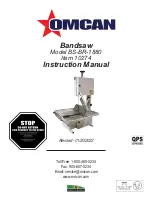
8. Tightening torque adjustment.
(1) Tightening torque
Tightening torque should correspond in its intensity to
the screw diameter. When too strong power is used,
the screw head may be broken or be injured.
Be sure to adjust the clutch dial position according to
the screw diameter.
(2) Tightening torque indication (See Fig. 13, 15)
The tightening torque di
ff
ers depending on the type of
screw and the material being tightened.
The unit indicates the tightening torque with the
numbers “1, 4, 7 ... 22” on the clutch dial, and a dot.
The tightening torque at position “1” is the weakest
and the torque is strongest at the highest number.
(3) Adjusting the tightening torque (See Fig. 13, 15)
Rotate the clutch dial and line up the numbers “1, 4,
7, ... 22” on the clutch dial, or the dot, with the triangle
mark on the outer body. Adjust the clutch dial in the
weak or the strong torque direction according to the
torque you need.
9. Switch
operation
○
When the trigger switch is depressed, the tool rotates.
When the trigger is released, the tool stops.
When releasing the trigger of the switch, the brake will
be applied for immediate stopping.
○
The rotational speed of the drill can be controlled by
varying the amount that the trigger switch is pulled.
Speed is low when the trigger switch is pulled slightly
and increases as the trigger switch is pulled more.
10. For drilling into brick (DV18DBFL2)
Excessive pressing force never increases drilling
speed. It will not only damage the drill tip or reduce
working e
ffi
ciency, but could also shorten the service
life of drill bit. Operate the hammer drill within 10-20 kg
pressing force while drilling into brick.
CAUTION
●
The motor rotation may be locked to cease while
the unit is used as drill. While operating the
driver drill, take care not to lock the motor.
●
If the motor is locked, immediately turn the power
o
ff
. If the motor is locked for a while, the motor or
battery may be burnt.
●
Too long hammering may cause the screw
broken due to excessive tightening.
11. How to select tightening torque and rotational speed
CAUTION
●
The selection examples shown in Table 8 should
be considered as general standard. As di
ff
erent
types of tightening screws and di
ff
erent materials
to be tightened are used in actual works proper
adjustments are naturally necessary.
●
When using the driver drill/hammer drill with a
machine screw at HIGH (high speed), a screw
may damage or a bit may loose due to the
tightning torque is too strong. Use the driver
drill/hammer drill at LOW (low speed) when using
a machine screw.
NOTE
The use of the battery in a cold condition (below
0 degree Centigrade) can sometimes result in the
weakened tightening torque and reduced amount of
work. This, however, is a temporary phenomenon,
and returns to normal when the battery warms up.
Table 8
Use
Cap Position
Rotating speed selection (Position of the shift knob
LOW (Low speed)
HIGH (High speed)
Screw
tightening
Machine screw
1–22
For 1/4 in. (6 mm) or smaller
diameter screws.
For 1/4 in. (6 mm) or smaller
diameter screws.
Wood screw
1–
For #20 (8 mm) or smaller
nominal diameter screws.
For #16 (6 mm) or smaller
nominal diameter screws.
Drilling
Brick
(DV18DBFL2)
For 1/2 in. (13 mm) or smaller
diameters.
For 13/32 in. (10 mm) or smaller
diameters.
Wood
For 2 in. (50 mm) or smaller
diam-eters.
For 1 in. (24 mm) or smaller
diameters.
Metal
———
For drilling with a metal working
drill bit.
17
English
000Book̲DS18DBFL2̲metabo.indb 17
000Book̲DS18DBFL2̲metabo.indb 17
2020/11/05 17:45:56
2020/11/05 17:45:56
















































